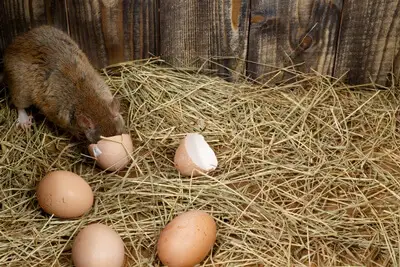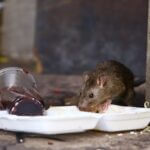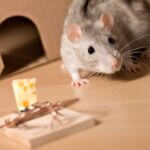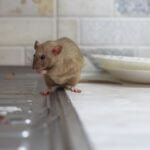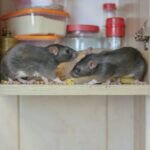Birds’ eggs are a nutrient-rich food source, so it shouldn’t surprise you that many animals (including rats) feed on them.
Nevertheless, if you suddenly find eggs missing from your poultry coop, you should be concerned about the presence of a rodent predator near your property.
Rats are omnivorous creatures, surviving on a plant and animal matter diet, including bird eggs.
However, rats rarely carry eggs back to their nests. Instead, they puncture holes in eggs and consume the nutritious egg white (albumen) and yolk. Also, rats may eat eggshells for calcium.
If you’ve noticed eggs missing from your bird coop, you’re dealing with a larger predator, such as a fox, magpie, or snake. Also, not that adult birds conceal the location of their eggs to keep them safe.
Do Rats Eat Bird Eggs?
Rats are opportunistic feeders, so they’ll eat anything edible in their living environment.
Birds’ eggs are rich in protein (amino acids), vitamins, and nutrients, such as vitamin B2, vitamin B12, vitamin D, selenium, and iodine.
Here are the sizes of bird eggs that rats consume:
| Bird | Average Mass |
| Chicken | 42.5 – 63.8 g |
| Ducks | 52 – 73 g |
| Quails | 6 – 16 g |
| Turkeys | 80 – 90 g |
| Red Jungle Fowl | 46 – 48 g |
Rats can detect feeding opportunities from afar.
If rats enter the coop, they’ll eat poultry feed and eggs. Though you’re unlikely to see them moving the eggs away, rats can be creative when there’s food around.
Instead of dragging the whole egg to a safer feeding location, rats may break the eggshell and consume the egg white and yolk.
Rats can damage your poultry coop by gnawing on the structure. They also prey on small chicks, injuring and infecting birds with deadly diseases.
How Does A Rat Steal An Egg?
Rats prefer to crack the eggs and feed on them on the spot.
However, they’ll often steal eggs from a coop if the opportunity presents itself or they want to move the eggs to a safer feeding location.
Despite their body size, rats have devised ingenious ways of transporting eggs without breaking them.
Egg Pushing Method
One method is rolling them with their paws or pushing them with their snouts. This tactic works best when moving eggs along a flat surface with minimal bumps or obstacles.
Egg-Wagon Method
According to The Scientific Monthly, rats steal eggs using the egg-wagon method.
This strategy involves two or more rats working together. One rat lies on its back and clasps the egg tightly between its legs while the other rat drags it by the tail to the desired location.
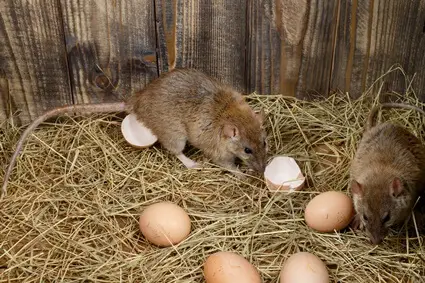
How Do You Know If Rats Are Stealing Bird Eggs?
Eggs are sought-after food for many animals, including dogs, raccoons, foxes, squirrels, snakes, magpies, and rats. So, when you find eggs missing from a poultry coup, it may not be apparent which of these animals is the culprit.
However, there are signs that rats are to blame, including rat droppings and urine, greasy marks, and gnaw marks on wood and chicken coop wires.
How To Stop Rats from Eating Eggs?
You need to rat-proof your coup to ensure rats can’t enter and eat eggs during the night.
Here are pre-emptive measures you can take to protect birds and their eggs against the threat of rats:
Block Openings Larger Than ½ Inch
Rats can pass through openings larger than ½ an inch in diameter.
Their flexible bodies and collapsible rib cages allow them to squeeze through the tiniest cracks or holes in the ground or wall as long as they can fit their heads inside.
For this reason, you should survey your poultry coop for any entry points and block them.
Elevate The Coop
Rats possess some of the most impressive athletic abilities of any household pests.
Rats are excellent climbers and can jump to heights of up to 36 inches. Consequently, leaving a bird’s nesting box at ground level leaves your bird’s eggs vulnerable to rats.
Raising your coop to about 4 feet above the ground makes it harder for rats to access it.
Also, attach a sheet of smooth metal around the base of the nesting box to prevent rats from climbing.
Plant Peppermint
Rats find the pungent aroma of peppermint unpleasant since it interferes with their sense of smell and, by extension, their ability to locate food or anticipate danger.
Planting peppermint around your poultry coup can keep rats away from the coop, keeping any eggs safe. You can also sprinkle peppermint stalks and leaves inside the poultry coop or place cotton peppermint balls to deter rats from entering.
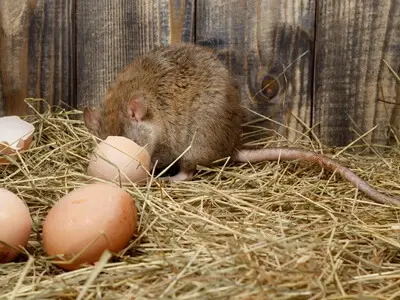
No Poultry Feed Left Overnight
As mentioned, rats are primarily drawn to nesting boxes by the smell of food.
Since rats mainly forage at night, leaving your poultry feed unattended will lure them inside the coop. Here, they can eat without worrying about any threats.
To prevent this, remove poultry feed from your coops at night and store it in a secure location where rats can’t access it.
Also, cover the feeders to prevent rats from eating any crumbs left over from your birds’ previous meals.
Snap Traps Around Nesting Boxes
Installing snap traps outside the poultry coop is an easy way to remove rats so they don’t eat eggs. Bait the traps with foods that rats enjoy, such as bacon, dried fruit, and peanut butter.
You’ll have more success catching rats using snap traps if you use different bait or switch up the location of the traps after every successful catch.
Rats have a remarkable memory and learn to avoid specific traps and locations where they’ve observed other rats being captured and killed.
Changing the bait and location of the traps regularly makes the rats less cautious, thus increasing your chances of catching and removing them.
If the eggs in your poultry coop are missing more frequently than normal, you may have a more severe rat problem.

